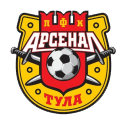FC Arsenal Tula
 | |||
| Full name | Football Club Arsenal Tula | ||
|---|---|---|---|
| Nickname(s) | Red-yellows, Canoneers, "Pryaniki" (Gingercakes), "Pushkari" (artillerymen), "Oruzheyniki" (Gunmen), Samovars. | ||
| Founded | 1946 | ||
| Ground | Arsenal Stadium | ||
| Capacity | 20,048 | ||
| Chairman | Pyotr Koshelnikov | ||
| Manager | Dmitri Alenichev | ||
| League | Russian Premier League | ||
| 2013–14 | 2nd - National Football League (promoted) | ||
|
| |||
Arsenal Tula (Russian: ФК «Арсенал» Тула) is a Russian football team from Tula. It played professionally in 1946, 1949 and 1959 to 2006. It played on the second-highest level (Soviet First League and Russian First Division) in 1949, 1959–62, 1967–69, 1998–01 and 2004, where its best result was 5th place in 1969 and 1998. Until 2012 it played in the Amateur Football League. On 18 July 2012, Arsenal's participation in the Russian Second Division for the 2012–13 season was officially confirmed.
After the end of 2013–14 season of Russian National Football League, FC Arsenal Tula is promoted to Russian Premier League after finished the competition as runner-up. Thus Arsenal Tula made 3 successive promotion and will make debut in 2014–15 Russian Premier League.
Team name history
- 1946–58: FC Zenit Tula
- 1959–61: FC Trud Tula
- 1962–63: FC Shakhtyor Tula
- 1964–74: FC Metallurg Tula
- 1975–79: FC Mashinostroitel Tula
- 1980–83: FC TOZ Tula
- 1984–06: FC Arsenal Tula
- 2007: FC Oruzheynik Tula (formed based on the squad and staff of FC Arsenal Tula, but was not a legal successor to Arsenal)
- 2008–12: FC Arsenal-Tula (formed based on the squad and staff of FC Oruzheynik Tula, but was not a legal successor to Oruzheynik)
- 2011–: FC Arsenal Tula
Etymology
The name of the city is of pre-Russian Pene, probably Baltic, origin.[1]
Current squad
As of Aprl 18, 2015, according to the official RFPL website.
Note: Flags indicate national team as defined under FIFA eligibility rules. Players may hold more than one non-FIFA nationality.
|
|
Youth team
Note: Flags indicate national team as defined under FIFA eligibility rules. Players may hold more than one non-FIFA nationality.
|
|
Farm club
The farm club FC Arsenal-2 Tula participates in the third tier of professional Russian soccer, Russian Professional Football League, beginning with the 2014–15 season. Another team was called Arsenal-2 and competed professionally from 1998 to 2002, it last competed as FC Dynamo Tula.
Notable players
Had international caps for their respective countries. Players whose name is listed in bold represented their countries while playing for Arsenal.
|
|
Managers
 Yevhen Kucherevskyi (1997–99)
Yevhen Kucherevskyi (1997–99) Leonid Buryak (1999)
Leonid Buryak (1999) Vladimir Fedotov (2001)
Vladimir Fedotov (2001) Boris Stukalov (2004)
Boris Stukalov (2004) Dmitri Alenichev (2011–)
Dmitri Alenichev (2011–)
References
- ↑ Е. М. Поспелов. "Географические названия мира". Москва: Русские словари, 1998, p. 423: "The earliest etymologies derived the place name from Russian dialectal tulá 'hidden, unreachable place'... The pre-Russian origin of the name of the river and town is no longer doubted [Maiorova 1985].... Since the name of the river Upa is certainly Baltic..., its tributary *Tula [the presumed earlier form of Tulitsa] may also be of Baltic origin, which is supported by a series of parallels in Lithuanian toponymy: the river Tule, the Tulis swamp, the Tulyte field, the meadow Tulejos, the valley Tulija, etc. [Vanagas, 1981]; the meaning of these toponyms is not entirely clear...."
External links
- Official website
- (Russian) Official fan-club site
- (Russian) Team history at KLISF